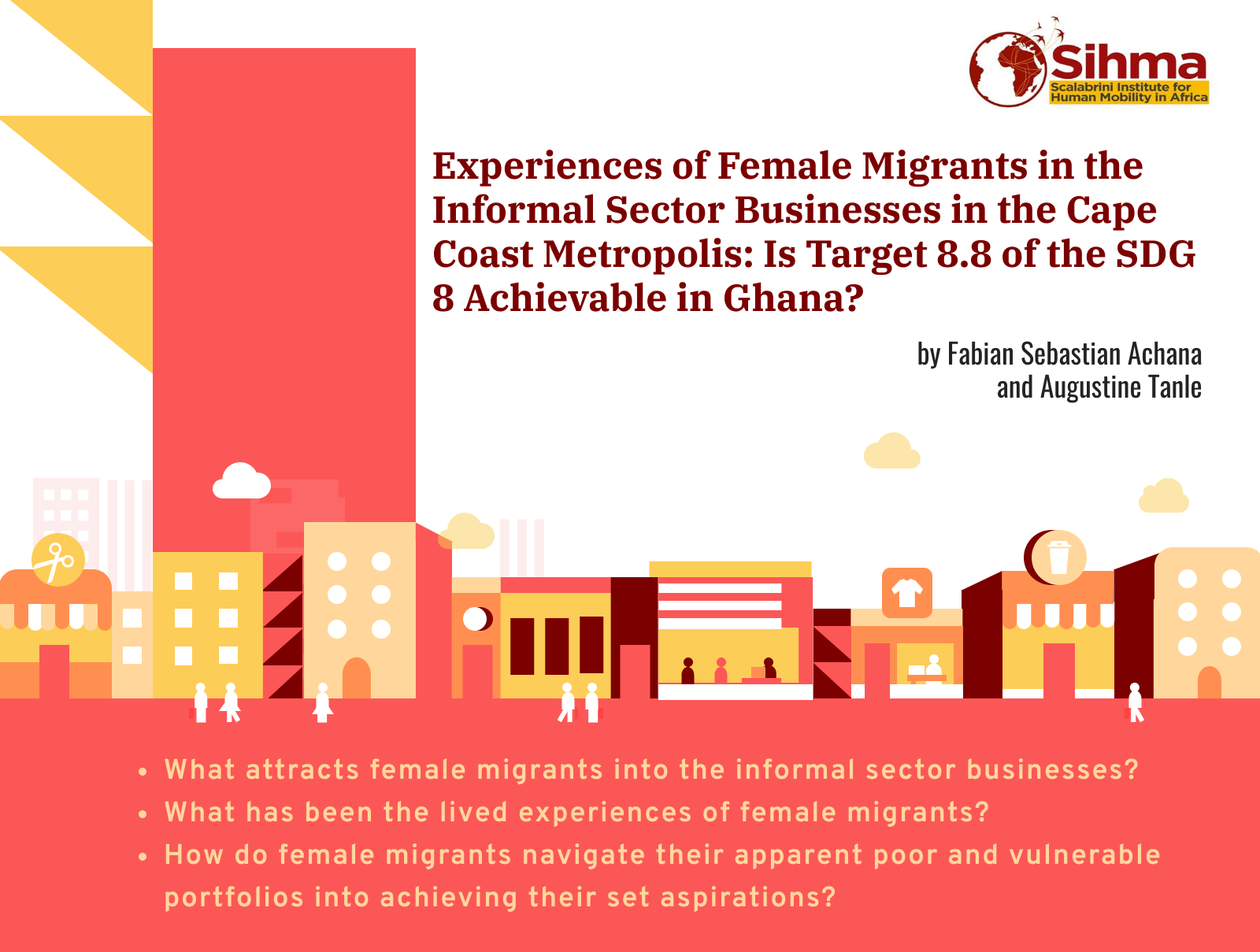
Female Migrants in the Informal Sector (Ghana)
Of the 272 million migrants worldwide, 47.9% of them are females (1). Most are workers in the informal business sector, and oftentimes face different challenges than their male counterparts (2). Published in the most recent African Human Mobility Review, Fabian Sebastian Achana and Augustine Tanle of the University of Cape Coast, Ghana, document the circumstances, motivations, lived experiences, and future aspirations of female migrants engaged in informal sector businesses in Cape Coast Metropolis of the Central Region of Ghana. The article is entitled: ‘The Lived Experience and Circumstances of Female Migrants in the Informal Sector Businesses in the Cape Coast Metropolis, and Suggestions for Restorative Efforts’ (3). They pose a few very crucial questions: 1) What attracts female migrants into the informal sector businesses, 2) What has been the lived experiences of female migrants, and 3) How do female migrants navigate their apparent poor and vulnerable portfolios into achieving their set aspirations? Achana and Tanle research the heart of these important questions.
The researchers focus on whether the attainment of the Sustainable Development Goals (SDGs) in Ghana, especially Target 8.8 of Goal 8, are obtainable in Cape Coast Metropolis. Goal 8 seeks to “promote inclusive and sustainable economic growth, full and productive employment and decent work for all” whilst Target 8.8 seeks to “protect labour rights and promote safe and secure working environments for all including female migrant workers, and those engaged in high risk jobs” (4). The dangerous working conditions and poor wages of the informal business sector puts these goals at risk.
Seven out of every ten people who engage in the informal sector businesses in the Cape Coast Metropolis are migrants (5). They hold jobs such as domestic servants, auxiliary workers of pubs, and local restaurants (also known locally as “chop bars”) (6). Many of these workers chose to migrate as a result of poverty, the search for employment, parental irresponsibility, and marital instability (7). They found a remedy from these ills in the informal sector. Employment in informal businesses became a key source of livelihood and income generation (6). Motivations and aspirations for engaging in informal business activities include availability of job opportunities, work environment, including location and security of the job, remuneration, welfare policies such as paid annual and sick leave, health insurance, and social security policies (8).
Despite these benefits, the sector is fraught with many challenges, including the absence of regulations, thereby exposing vulnerable actors in the sector to exploitation, physical and sexual abuse, accidents, low financial remuneration and other health risks (9). Female migrants are underpaid, overworked, and go to work in hazardous environments where they frequently encounter abusive clients, co-workers, and even employers. They complain of stress at work which causes bodily pains and fatigue (10). The living and sleeping arrangements expose the migrants to some amount of risk including weather vagaries, theft, physical abuse, and even rape (11). On top of it all, female migrants often face verbal abuse from their employers. One of the participants told researchers Achana and Tanle, “I was sweeping the bar one day and had a big cut from a broken bottle. My madam [employer] told me to continue to work even though I was in much pain. I had no choice, so I had to work with the pains like that” (12). Lived experiences such as this one are far too common.
Without too many other alternatives, female migrant workers enter the informal business sector. Their migration and engagement were personal and voluntary, as well as structural and driven by gendered inequalities and economic motivations as espoused by the neoclassical micro-economic theory of migration (13). Given that most of the participants in the study had little or no formal education, their chances of securing formal employment were very minimal (14). Because of the lack of choice, the lack of social mobility, and the lack of economic freedom and opportunity, there is an urgent need to enforce the relevant laws and policies to protect the fundamental human rights, safety, health, and well-being of females in Ghana (15). The informal sector businesses in the Cape Coast Metropolis are highly unstructured and unregulated (15), and change must come.
The steps needed to be taken: enforce the Ghana Labour Act of 2003 (Act 651), operationalization of the legal advocacy for women in Africa, and collaboration among non-governmental organizations, civil society groups, and religious bodies to address the structural, as well as personal challenges of migrants. Migrants should be encouraged to form unions with leadership structures for easy reach and engagement (15). Power and protection must be restored to female migrants.

James Chapman and Nell Fredericks
SIHMA SIHMA
Project Manager Communication and Research Intern
Sources:
1 UNDESA, 2019 - https://www.un.org/en/development/desa/population/migration/publications/migrationreport/docs/InternationalMigration2019_Report.pdfInfographic References:
- Heading and author quote - AHMR Vol 6 No 2 p58, 2020
- Questions - AHMR Vol 6 No 2 p59-60, 2020
- Statistics: - 272 million figure and bar-graph figures - UNDESA, 2019 - 42.5% figure - Ghanaian 2010 Population Census (Government of Ghana, 2012) -70% figure - Tanle, 2018
- Participants quotes - AHMR Vol 6 No 2 p70, 2020
- ILO, 2018
Categories:
Tags:

